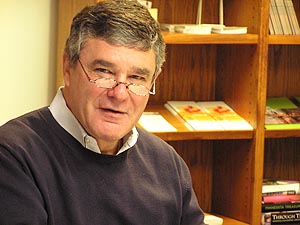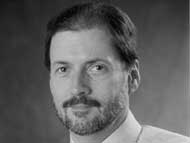Keep glued to KNOW
November 19th, 2006

Tom Micheletti, Excelsior – Photo stolen from Stephanie Hemphill, MPR
This past week, the phone was ringing off the hook, inbox ablaze, media of various sorts proving that Mercury has gone direct and communication’s a happenin’ thang, and all about energy, from Mesaba coal gasification, to gas v. coal v. IGCC, to nuclear to CapX2020 (FINALLY, somebody’s paying attention to CapX2020, you’d think that with 200,000 landowners affected they’d be all over it, but nooooo).

Bob Kelleher got the biggest chortle of the week when he said unabashedly, “Hey, reporters don’t know EVERYTHING!” Oh, Bob, don’t burst my bubble like that… I hold you guys in high esteem, if YOU don’t know, who will tell the world? Reporters are omniscient! Keep nosing around and don’t prove me wrong! With the Mesaba Project particularly, there’s a lot going on, and a lot of rocks to be overturned.
Anyway, here’s the poop about the hearings that aren’t happening this week, cancelled, nada… a good thing for me because my father’s in renal failure and is about to check out, I’m not concentrating real well. But it means a lot that I’m working against the Mesaba Project with Ross Hammond, P.E., the engineer son of my father’s boss — that’s just such a cool circle to complete. This Mesaba Project will go down in flames in tribute to our fathers, engineers slaving away above the Gay 90’s on 4th & Washington for decades building coal plants, nuclear… those engineers who gave us some skills and taught us a few things…
For all the Prefiled Testimony in this case, either go over to the R side for “Mesaba Testimony” or with a click, go to www.mncoalgasplant.com/ppa.html and scroll down. There’s a lot there, and it’s GOOD STUFF!
Here’s Bob’s report (listen online HERE):
The arguments over Excelsior Energy
by Bob Kelleher, Minnesota Public Radio
November 19, 2006In the coming weeks there’s going to be a lot of debate over Excelsior Energy’s proposed coal gasification power plant for the Iron Range. Hearings were due to start today, but the parties involved have agreed to submit written testimony instead.
At stake is a $2 billion; 600 megawatt power plant, that would provide 1,000 construction jobs; and more than 100 permanent jobs on the Iron Range.
However, some people, including some within the power industry question whether it’s a wise project.
Duluth, Minn. â?? The proceedings are intended to make a very simple decision over a very complicated project.
An administrative judge will advise the Public Utilities Commission early next year, whether Minneapolis-based Xcel Energy will have to purchase the electric output of Excelsior Energy’s proposed Mesaba Energy Project.
Without a dedicated customer, the Iron Range coal gasification power plant won’t get built.
To make that decision, state statute says the judge will consider two things: whether the project can be the low-cost electricity producer; and whether the project is in the public interest.
And the opponents are lining up to argue the Mesaba project does neither.
An expert for the Minnesota Department of Commerce says the project is not likely to produce low cost electricity. And that worries the state’s business community. Bill Blazar is with the Minnesota Chamber of Commerce.
“If the analysis shows that the electric rates for Xcel customers would be higher than they otherwise would be, then we need to figure out the impact on jobs and the economy of that, and if it turns out that it’s negative, then I think we’ve got to scratch our heads and question ourselves whether the project is in the public interest,” Blazar says.
Blazar wonders how well the public is served if Xcel’s customers in places like St. Cloud, Winona, and the Twin Cities have to pick up the bill for economic development on the Iron Range.
He also worries about the gasification plant’s unproven technology, at least on this scale.
The project is intended to burn a synthetic gas from coal, but it can burn natural gas instead, say, if the coal gasification unit isn’t working.
“And that is troubling to business customers, because natural gas is expensive,” says Blazar. “The electricity that it produces is expensive. And a lot of manufacturers use natural gas for other processes. And to the extent that we use it to generate electricity, it tends to drive up the cost of the commodity.”
Others argue that the power plant has no place in Northeast Minnesota.
Margaret Hodnik, with Duluth-based Minnesota Power, says the Iron Range already faces stringent federal pollution rules because of Voyaguers National Park and the Boundary Waters Canoe Area Wilderness. There are several major industries proposed for the Iron Range. Each would add pollution to the same air shed.
“We think that it’s going to be very challenging to permit all these projects and fit them in,” Hodnik says. “Probably not all of them will happen, but if the Mesaba project is built it will have emissions, and it will take up some of this air-shed, as it’s called. And so that air-shed will not be available for other projects that may come in.”
Hodnik says the Iron Range is better suited for projects based on the region’s minerals or timber. And she argues that new pollution equipment can make even older coal fired plants almost as clean as integrated coal gasification plants like the Mesaba Energy Project.
“IGCC plants, the type of technology they proposed, as compared to a modern super-critical coal plant, which is a more traditional technology, is not significantly better,” Hodnik says. “It’s a few percentage points better on the emissions in question, but it’s not significantly better.”
But that’s just wrong, according to Tom Micheletti, Co-President of the company behind the Mesaba Energy Project.
“Isn’t that funny, that the single largest polluter in Northeastern Minnesota, by far, would take the position that a new, clean technology, whose emissions are a fraction of their plants, would say that we’re the environmental problem?” Micheletti says. “It borders on the ludicrous.”
According to Micheletti, pollution reductions underway at Minnesota Power’s coal-fired plants will provide more than enough air-shed to permit not only his power plant, but other proposed Iron Range Industries as well. He says gasification is proven much cleaner by all measures than conventional coal. And he says his experts have demonstrated that the Mesaba Energy Project will produce electricity cheaper than any other available source.
=================
“And it’s unchallenged in the record, the costs that are association with a pulverized coal plant, and the costs that are associated with our plant,” Micheletti says. “And so I think what you’re seeing here is the utilities doing essentially all that they can to prevent competition.”
“If the analysis shows that the electric rates for Xcel customers would be higher than they otherwise would be, then we need to figure out the impact on jobs and the economy of that, and if it turns out that it’s negative, then I think we’ve got to s
– Bill Blazar, Minnesota Chamber of Commerce
As the least cost provider, Micheletti says, it’s an easy argument the project will be in the public interest.
“Given that fact, almost by definition, the electricity from our plant will be of benefit throughout the entire state by all of those who use it,” Micheletti says. “Because the alternatives that they face are higher costs, probably, and probably dirtier power plants.”
But there’s more to go into the cost equation, according to Carol Overland. She’s an attorney representing a citizen’s group opposed to the project. Overland argues the real costs should include direct costs like government investment and indirect costs such as from pollution.
“You’ve got local governments taking on putting in a railroad; putting in transmission lines; putting in gas service,” says Overland. “You’ve got the water – process water – 6,500 gallons a minute coming in. How much going out? There will have to be a treatment plant to deal with the really serious things like arsenic, selenium, cyanide, that are in the water. What will that cost?”
Overland agreed only reluctantly to the cancellation of this week’s public expert testimony.
“For those of us without resources, and without the ability to hire expert witnesses for tens of thousands of dollars, we get our exhibits and our evidence in through cross examination,” Overland says. “So, … to give that up, that’s significant. And I am queasy about it.”
There will still be opportunity for public input in open forums. The Public Utilities Commission has scheduled hearings in St Paul, Hoyt Lakes, and Taconite in late December. The Administrative Judge’s recommendation is expected in February. But his role is only advisory. The final decision rests with the Public Utilities Commission.
Leave a Reply